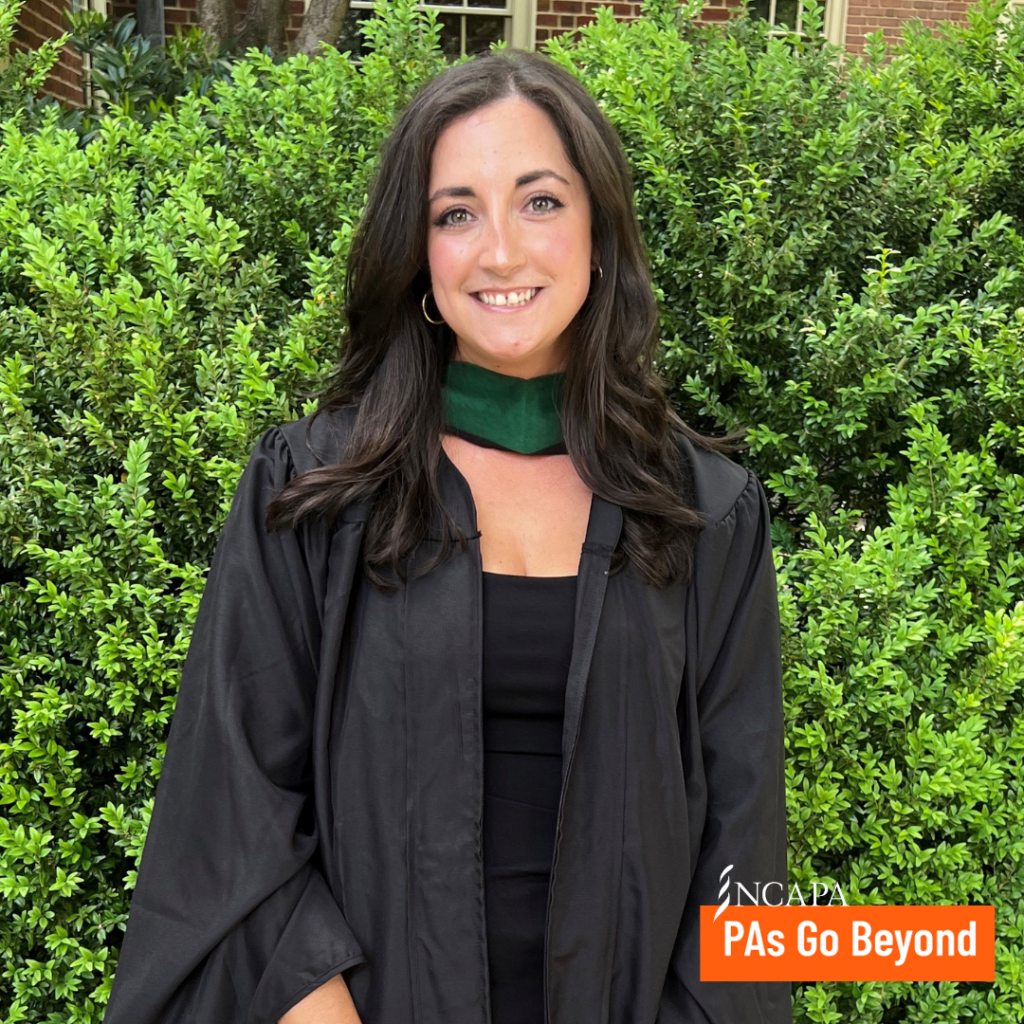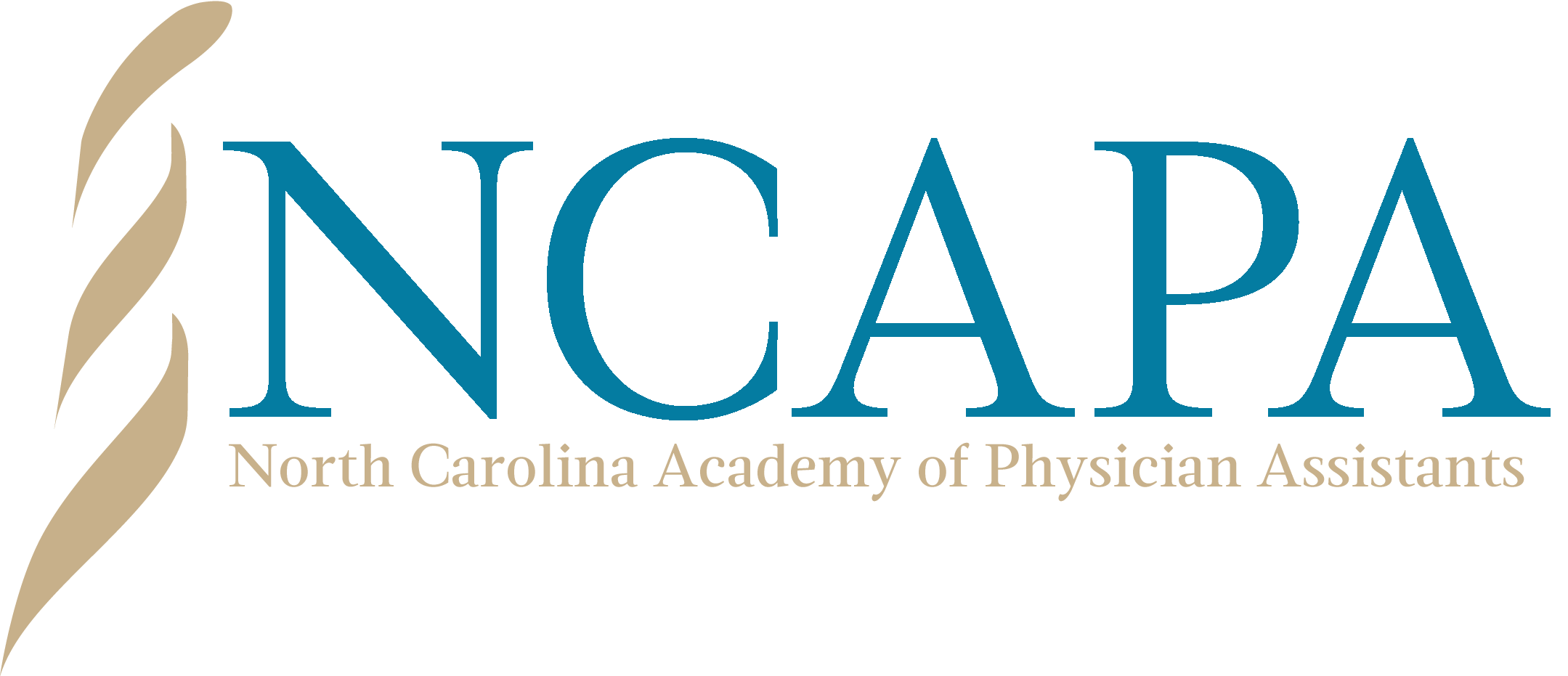
As part of the 2023 PA Week Celebration, the North Carolina Academy of Physician Assistants (NCAPA) are highlighting NCAPA Members and PAs Going Beyond at every stage of their PA career, from being a Pre-PA to having been a practicing PA for over 20 years – and everything in between.

For the NCAPA’s Early Career PA Highlight & Interview for the 2023 PA Week, the NCAPA sat down with Courtney Martin, PA-C, a Wake Forest PA Program graduate who is currently serving via the National Health Service Corps in a federally qualified health center family practice in north central NC.
Tell us about your current role.
I have only been in this position a couple months, but since getting into my daily routine, I split my time between two different offices, seeing patients Tuesday through Friday. I have one administrative day where I work from home with the comfort of my miniature goldendoodle, Aspen. I am very fortunate to work with an outstanding group of providers in an interdisciplinary clinic seeing patients of all ages.
Especially in working as an early career PA, I rely heavily on the skills garnered from my inquiry-based PA school curriculum. My program used case-based learning to emphasize meeting each patient where they are, acknowledging what makes the patient sitting in front of you unique and diverse. I work hard every day to employ the effective communication skills I took away from my schooling to tailor my care to my different patient populations. I’m not afraid to admit that I’m uncertain about something but make it clear to my patient that I will work alongside them to figure out the best next steps or treatment approach.
What made you decide to be a PA? What encouraged you to apply to PA school?
Prior to attending PA school, I worked as a Certified Athletic Trainer (AT) in both the school based and orthopedic settings. I had many athletes who came from under, or uninsured families coming to me with non-sports medicine complaints, and I was unable to help them. Growing up I had thought I wanted to go to medical school, so I realized becoming a PA would allow me to broaden my scope in medicine while honoring the experience I brought to the table as a AT. I loved working with the populations that needed care most, and so I ultimately took the necessary prerequisites, changed jobs to get more primary care clinical experience, and applied to both PA school and the National Health Service Corps.
Do you have any tips for succeeding in PA school?
I think PA school is a unique challenge to everyone who goes through it. However, I have a few pointers that I feel helped me succeed!
- 1) I treated school like a job, having work hours and ‘me time’ hours
- 2) I prioritized movement, trying to lift weights or get in a walk at least a few times per week
- 3) I used active recall techniques to study, mixing in study groups, drawing things out on whiteboards, and watching summary videos to emphasize my learning
- 4) I made sure to have some fun! I was fortunate enough to be in the beautiful mountains of NC and during school went on several hikes, explored the local cuisine, and tried to enjoy that phase of my life.
Now that you have graduated PA school, what is your favorite thing about being a PA?
I love being able to use my skills and knowledge to explain to my patient something that may be otherwise be confusing or scary to them. Just by taking the time to explain things in terms they understand, I’ve seen a weight be taken off a patient’s shoulders. Primary care is especially unique in getting to see patients of all ages, and I especially love caring for families.
Why did you want to become a member of the NCAPA? Do you think membership is valuable?
As a Wake student, I was automatically offered membership into the NCAPA, but as a member I have already participated in many regional chapter events including lecturing on the topic of concussions, have seen the value in all the advocacy work the NCAPA does for the PA profession, and hope to use the member database to connect with other PA’s in my more rural area of the state. I absolutely plan to continue my membership as a practicing PA!
How do you want the PA profession to change in the next 5 or 10 years?
I think the PA profession is poised to grow in terms of continuing to garner respect from other healthcare professionals. We are all practicing on the same team to better care for our patients. I feel that North Carolina is a great place for PAs to practice.
What are some of your passions/interests aside from being a PA?
If I’m not at work, you can find me in the gym, curled up reading a good book, organizing a new area of my home, skiing, rewatching Gilmore Girls, or planning a themed get together with my friends and family.
And, if you weren’t a PA, what would you be doing instead?
If I woke up tomorrow and wasn’t a PA, I would be one of two things – a combo bookstore and coffee shop owner (not so subtle nod to my love for Gilmore Girls) or a professional home organizer.

